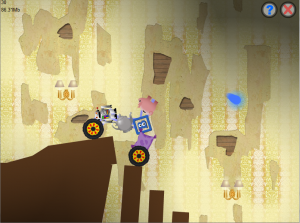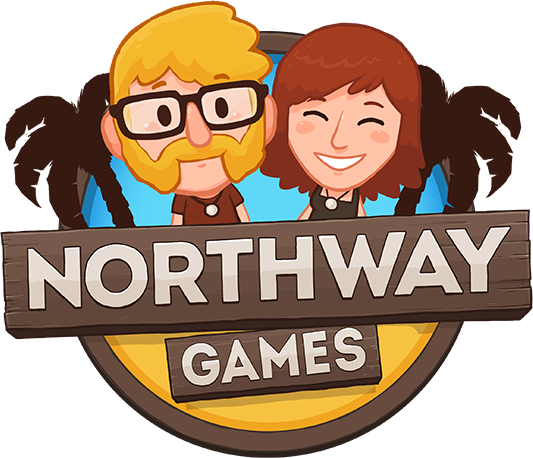 Adam Saltsman wrote an article for Gamasutra about Brainstorming and the limits of Brainstorming. He talks about how brainstorming is not equivalent to game design. My only comment by the time I got to the end of the article was pretty much “yeah, duh”. But that isn’t the reaction of a lot of people and after reading their reactions I feel like I read a slightly different article than they did.
Adam Saltsman wrote an article for Gamasutra about Brainstorming and the limits of Brainstorming. He talks about how brainstorming is not equivalent to game design. My only comment by the time I got to the end of the article was pretty much “yeah, duh”. But that isn’t the reaction of a lot of people and after reading their reactions I feel like I read a slightly different article than they did.
A lot of responses have been about defending brainstorming and I guess I didn’t feel like it was an assault on brainstorming but rather it questioned whether you could know if a game idea was any good before actually trying it out. Adam’s conclusion was “no” and I agree with that whole heartedly. I’d go further to say that you don’t really have a clue of what your idea really is. To show you what I mean let me tell you a story:
I suck at drawing but when I was six years old I hadn’t figured that out yet. I vivdly remember six year old me having a very odd drawing experience. One day I decided I was going to draw a dragon. This seemed like it was going to be easy. I knew what a dragon looked like. When I pictured a dragon in my minds eye it was all there. Pointy claws, jagged spikes along its back, long smoking snout, the whole thing. I knew exactly what a dragon looked like and drawing it was going to be a piece of cake.

Wrong! I couldn’t draw a dragon, I still can’t draw a dragon. I still think I know exactly what a dragon looks like but when I have to prove it I fail utterly. I think this has to do with how the brain stores information. We seem to be very metaphorical creatures and I think we store kind of a metaphor of a dragon. We store some important features that help us define what a dragon is but we don’t store 90% of the details. Only the really _draggony_ bits.
Game design is the same way but worse. Most game ideas you hear on the streets are of the “you’re a window-washer with a jetpack” variety. You can hear this statement and the finished game stretches out before you. You can almost play it. Except you can’t. That’s an illusion. Your brain is just taking what is special about two things, jetpacks, and window washing, and adding them together. There are a million design problems to solve before you have an actual finished game. I know it feels to you like you know exactly how that game is going to play and how fun it is or isn’t going to be but you _don’t_. You can make a bad guess, that’s as far as it goes. I know because I have those ideas professionally.

I spent two years prototyping games before I found Incredipede. I thought I understood all the nooks and crannies of those failed games before I ever started them. I thought I knew how fun they where going to be. I had no idea. Video Games are a very hard thing to imagine. They involve rule-sets interacting with eachother (often in real time) and we are not good at imagining how two or more rulesets will interact. It’s a very hard problem. Imagine playing several games of chess simultaneously with no boards. We _feel_ like we know something about our ideas but in fact it’s just a lie.
This is why the games industry has phrases like “ideas are worthless”. Not because your idea isn’t good but because your idea is a mere shadow of a finished game and no one can tell if that game will be fun or not. Not even you. That’s why Petri Purho‘s Rule-of-Ten resonates so much with me. Petri hypothesised that for every ten games you write one will be good. There’s no way to know which one. You just gotta sit down and pound ’em out ’till something works.
Is there a bright side to this seemingly depressing state of affairs? Well when a game works it _works_. You will morph and grow your game into something greater than you ever could have imagined. The game will get further and further from your original mechanics and closer and closer to that raw inspiring idea that was really at the heart of your excitement.
No one invents great video games sitting on the john. They invent them sitting at their keyboards pushing and pulling and playing.


Comments
23 responses to “Can You See the Dragon? (no you can’t)”
The problem is that artfags/academia value the process not the result.
It’s a standard clash of values between creators and poseurs.
Hence the idea has value the process has value and it doesn’t matter if the result is shite.
In fact its better all round if there is no result just endless blogposts about the journey and maybe a kickstarter fund.
Or even better the result can only be played by 5 famous people and then it self destructs leaving nothing but a memory.
Indeed if one does nothing but brainstorming then one is doing important exploration work. Also if anyone makes anything in the future resembling your idea then you can call SQUIDI on it and invoke plagiarism because you were there first, right?
Articles like this make it worth keeping an eye on this blog. :)
So…uhm, when is Rebuild 2 set to be released?
Great post!
I’ve always dreamed of writing such post, it was all clear in my mind, but couldn’t write it for some reason. Now that you do it for me, I can go and share it.
:)
I love this post, given how well it reflects my own experiences over the past couple years. :p I’ve already shared it with several aspiring game developers.
However, I’ve gotten a bit of resistance from some people I’ve shared it with, so I thought I’d clarify my perspective on it here.
I see the position that you present in the article as one extreme, and my own perspective is more neutral – I do believe that it is possible to gain skill in coming up with good ideas, just like expert chess players are simply better at seeing good moves.
I also think the comparison to drawing is completely valid, as different as drawing and game development are, for the kind of point you are trying to make. However, given that one can learn to draw better with practice, it would seem that this contradicts your earlier point about that being mostly impossible with games.
To me, the main point is that coming up with good game ideas, and knowing whether those ideas are any good a priori, is much harder than people generally believe it to me, though it may be possible to get better with practice. Still, given how much I see experienced game designers (Danc) go through the same process of inventing ideas and prototyping them for months only to find that they fall short of expectations, I am certainly inclined to believe that this is a very common situation and difficult to fundamentally change.
So, I like the article because it provides a contrasting view to the assumptions that many beginning game developers carry, and may open their minds in a useful way. But I do not mean to put it up as absolute truth.
No, it’s true. It’s not that you can’t guess at all about what’s going to be fun or not, it’s just much harder than it seems.
I think you can get better at it but it’s a hard thing to practice because you don’t know if you’re right or not until you actually make the game.
This reminds me of the guy who invented Trism. He made this amazing game for the iPad, got all kinds of attention, Apple made a movie about him, and later, under pressure of trying to create another hit, he found it very, very hard. He shelved many ideas, just like you. I hope he keeps going!
… [Trackback]
[…] Read More Information here to that Topic: northwaygames.com/can-you-see-the-dragon-no-you-cant/ […]
… [Trackback]
[…] There you will find 26652 additional Info on that Topic: northwaygames.com/can-you-see-the-dragon-no-you-cant/ […]
… [Trackback]
[…] Find More here to that Topic: northwaygames.com/can-you-see-the-dragon-no-you-cant/ […]
… [Trackback]
[…] Read More Info here to that Topic: northwaygames.com/can-you-see-the-dragon-no-you-cant/ […]
… [Trackback]
[…] There you can find 72884 additional Info to that Topic: northwaygames.com/can-you-see-the-dragon-no-you-cant/ […]
… [Trackback]
[…] Read More to that Topic: northwaygames.com/can-you-see-the-dragon-no-you-cant/ […]
… [Trackback]
[…] Information on that Topic: northwaygames.com/can-you-see-the-dragon-no-you-cant/ […]
… [Trackback]
[…] Find More to that Topic: northwaygames.com/can-you-see-the-dragon-no-you-cant/ […]
… [Trackback]
[…] Here you can find 45412 more Info to that Topic: northwaygames.com/can-you-see-the-dragon-no-you-cant/ […]
… [Trackback]
[…] Find More to that Topic: northwaygames.com/can-you-see-the-dragon-no-you-cant/ […]
… [Trackback]
[…] Find More Information here on that Topic: northwaygames.com/can-you-see-the-dragon-no-you-cant/ […]
… [Trackback]
[…] There you will find 18274 additional Info on that Topic: northwaygames.com/can-you-see-the-dragon-no-you-cant/ […]
… [Trackback]
[…] There you can find 13705 additional Information on that Topic: northwaygames.com/can-you-see-the-dragon-no-you-cant/ […]
… [Trackback]
[…] Information to that Topic: northwaygames.com/can-you-see-the-dragon-no-you-cant/ […]
… [Trackback]
[…] Here you will find 14494 more Information on that Topic: northwaygames.com/can-you-see-the-dragon-no-you-cant/ […]